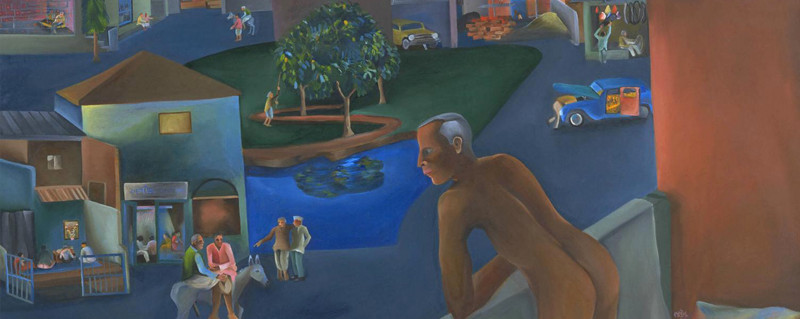Bhupen Khakhar
You Can't Please All
18 Nov 2016 - 05 Mar 2017
BHUPEN KHAKHAR
You Can’t Please All
18 November 2016 – 5 March 2017
‘...when I feel I’m telling the truth, then there is no restraint.’
Bhupen Khakhar in an interview with Sadanand Menon, 2003
Bhupen Khakhar (1934–2003) played a central role in modern Indian art and was a recognised international figure in 20th century painting. Active from the 1960s Khakhar was part of a lively new wave of narrative painting and figuration by artists in India that became known as the Baroda School. His practice evolved from the careful study of art from South Asian and European sources, even while he continued to work as an accountant part-time. After early experiments with Pop art Khakhar developed a style of painting that combined both high and low, popular and painterly aesthetics, cleverly subverting popular iconography. He confronted complex and provocative themes with candour: class difference; desire and homosexuality; and his personal battle with cancer. Also a writer, his critical observations and literary sensibility were evident in his sharp, often ironic depictions of difficult subjects.
The title of the exhibition comes from the iconic painting "You Can’t Please All", 1981 from the Tate collection. A naked figure stands with his back to the viewer, overlooking a dramatic scene, the depiction of a cautionary tale about a father and son who lose their prize donkey because they heed the meddlesome comments of passers-by. Thought to be a self-portrait, this painting was completed a few years after the artist returned to India after a short period in Britain. Khakhar courageously decided to be open about his homosexuality in his life and work. His intuitive understanding of the tensions between beauty and the grotesque resulted in unabashed depictions of human love and desire, weakness and suffering. His powerful work from this period is highlighted in this exhibition, bringing his unique and still relevant voice back into international circulation.
The first posthumous survey of Khakhar’s career, this exhibition - previously on view at Tate Modern from June 1st till November 6th, 2016 - will bring together his work from across five decades and from collections around the world. In his lifetime Khakhar exhibited frequently in India and abroad, including Documenta IX in Kassel in 1992. While he has been included in group exhibitions at Tate in the past, this retrospective will shed new light on his practice by presenting well known works on canvas and paper alongside rarely seen experimental works including textile, glass and ceramics.
You Can’t Please All
18 November 2016 – 5 March 2017
‘...when I feel I’m telling the truth, then there is no restraint.’
Bhupen Khakhar in an interview with Sadanand Menon, 2003
Bhupen Khakhar (1934–2003) played a central role in modern Indian art and was a recognised international figure in 20th century painting. Active from the 1960s Khakhar was part of a lively new wave of narrative painting and figuration by artists in India that became known as the Baroda School. His practice evolved from the careful study of art from South Asian and European sources, even while he continued to work as an accountant part-time. After early experiments with Pop art Khakhar developed a style of painting that combined both high and low, popular and painterly aesthetics, cleverly subverting popular iconography. He confronted complex and provocative themes with candour: class difference; desire and homosexuality; and his personal battle with cancer. Also a writer, his critical observations and literary sensibility were evident in his sharp, often ironic depictions of difficult subjects.
The title of the exhibition comes from the iconic painting "You Can’t Please All", 1981 from the Tate collection. A naked figure stands with his back to the viewer, overlooking a dramatic scene, the depiction of a cautionary tale about a father and son who lose their prize donkey because they heed the meddlesome comments of passers-by. Thought to be a self-portrait, this painting was completed a few years after the artist returned to India after a short period in Britain. Khakhar courageously decided to be open about his homosexuality in his life and work. His intuitive understanding of the tensions between beauty and the grotesque resulted in unabashed depictions of human love and desire, weakness and suffering. His powerful work from this period is highlighted in this exhibition, bringing his unique and still relevant voice back into international circulation.
The first posthumous survey of Khakhar’s career, this exhibition - previously on view at Tate Modern from June 1st till November 6th, 2016 - will bring together his work from across five decades and from collections around the world. In his lifetime Khakhar exhibited frequently in India and abroad, including Documenta IX in Kassel in 1992. While he has been included in group exhibitions at Tate in the past, this retrospective will shed new light on his practice by presenting well known works on canvas and paper alongside rarely seen experimental works including textile, glass and ceramics.

